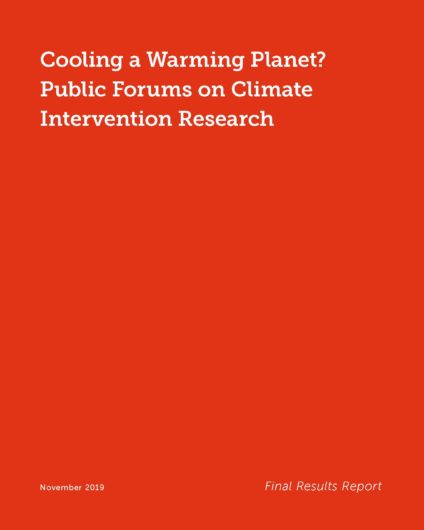Exploring Democratic Governance of Solar Geoengineering Research
Program Areas –
Project Summary & Report

With SRM research advancing to the field-research phase, CSPO and its partners used participatory technology assessment (pTA), a method of determining public values and opinions to help inform up-stream decision-making, as an instrument to elicit views on the governance of SRM research. After an iterative design process with both technical experts and members of the lay public, CSPO hosted two day-long public deliberations on the governance of SRM research in Boston and Phoenix in September 2018.
During the deliberations, 171 diverse citizens discussed SRM research directions, prospective funders, and governance parameters. The deliberations demonstrate that informed lay citizens can productively discuss SRM research governance, acquiring both new knowledge and, through collective reasoning, new perspectives on the subject. Our results offer insights into some concrete constraints and conditions under which members of the public could support SRM research.
Three broad areas of concern emerged from these deliberations:
- Naturalness is preferred. Citizens strongly prefer research on SRM approaches that seem to them more “natural” over those that add new chemicals and materials to the atmosphere. The collective intuition here is a concern for unintended environmental risks created by the introduction of unnatural substances into the climate system. This appears to be a robustly held sentiment among our participants, and pushes against current expert assumptions. Stratospheric aerosol injection, which is probably the approach most widely discussed by scientists, was favored by less than 20% of our deliberative groups.
- Transparency is required. The governance principle most strongly articulated and shared in our forums is transparency, although the meaning of the term is not sharply delineated. Yet the sentiment being expressed by our citizens seems quite clear: they expect that SRM research be sponsored by trusted institutions, conducted openly and in a publicly accountable manner, and protected from capture by biased or interested parties.
- Who shall govern? That SRM research does indeed require good governance was also a shared sensibility among our participants, as we have emphasized. But when it comes to institutional choices about where funding, governance responsibilities, and decision making should be located, disagreement emerges. This disagreement may in part reflect the different political environments of our forum locations, Phoenix and Boston. It may also reflect a lack of strong criteria for choosing among the options that we presented in the background material. Yet results do reflect some general sense that “independent” and “self-governing” approaches to governance are preferred to those of formal government bodies at either the national or local level. Given the lack of consensus on these matters, we want to flag these questions of institutional choice as an important area for future research on public concerns and how best to meet them.
The overall message for SRM researchers and stakeholders was clear: keep things small; govern transparently, flexibly, and inclusively; learn from past mistakes and be prepared to reverse course. Proceed—but with caution.
Explore public preferences in the project final report.
At the report launch, members of the research team shared some of the high level findings. Following the research presentation, panelists offered reflections on the project findings. The panel consisted of:
- Frank Keutsch, Harvard
- Jane Flegal, Spitzer Foundation
- Shuchi Talati, Union of Concerned Scientists
- Virginia Chanley, Government Accountability Office
- Panel Moderator: Ivan Amato
Suggested report citation:
Kaplan, Leah, John Nelson, David Tomblin, Mahmud Farooque, Jason Lloyd, Mark Neff, Bjørn Bedsted, and Dan Sarewitz. “Cooling a Warming Planet? Public Forums on Climate Intervention Research.” Washington, DC: ASU Consortium for Science, Policy & Outcomes (November 2019).